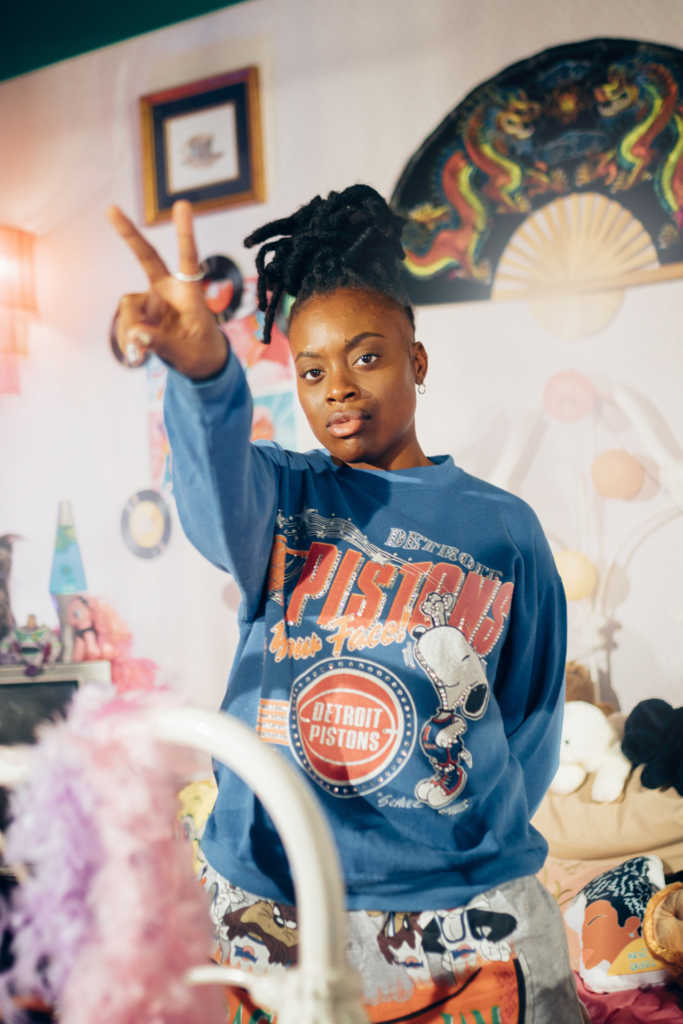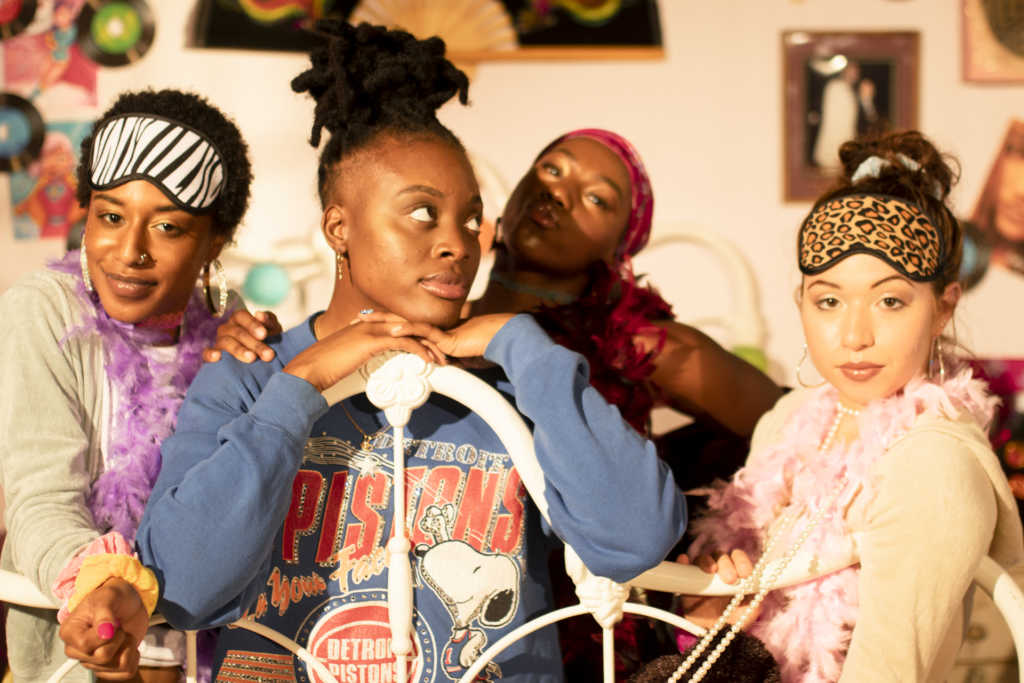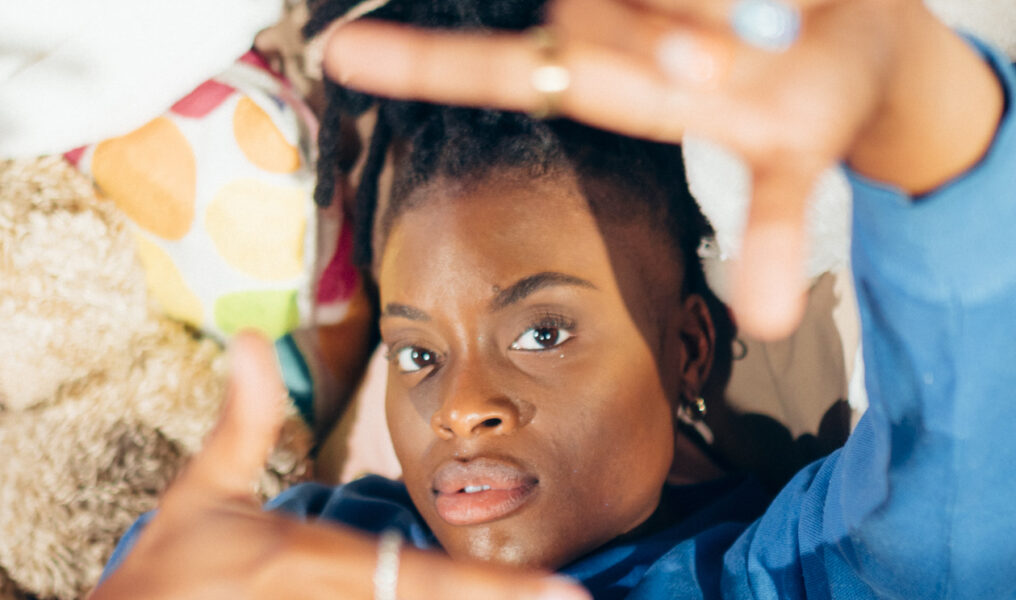Everyone thinks they know Siena Liggins. Originally from Saginaw but currently living in Atlanta — the 27-year-old artist has lived all over, really, including North Carolina — Liggins gets a lot of this in her Twitter DMs: "My last name is Liggins too." Or: "I found out you're my cousin today."
"I'm like, I had no idea I had family here," Liggins says from her home in Atlanta. "And also, are you sure?" On video, I tell her that maybe they think, ever since she released her smashingly brilliant debut record and visual album, "Ms. Out Tonight" in April, that her bank account has just completely exploded. Dollar bills everywhere. A fancy house. A fancy car. After all, her wonderfully filthy pop music is accessible and gay club-ready, and she made Billboard Pride's list of "20 new LGBTQ artists to fall in love with." So she should be making bank. But Liggins, laughing modestly, says about these folks who think she's their flush-with-cash cousin: "They'd be so sadly mistaken."
Liggins does have family all over — in fact, many members still live in Southfield and Detroit, off 8 Mile — so the cousin thing isn't such a stretch. Whether you do know Liggins, or just think you do, now's a good time to learn a few new things about one of Michigan's most promising talents.
How did growing up around Detroit nurture you as a musician?
One of my favorite movies when I was a kid was "The Temptations." So much of it was very familiar. You see a lot of the city in the movie. Being a kid that didn't really have a home — I was the new kid all the time — it was one of the very few movies that I could call out and be like, "I know where that is." I felt very familiar with it. And my grandma listened to a lot of The Temptations and Michael Jackson. My mom was a huge Michael Jackson fan. I listened to a lot of music that was very much Detroit music. I mean, I was very young and had a perspective on, like, who Berry Gordy was. (Laughs.)
What other memories do you have of growing up with Detroit music?
One of my journals from when I was a kid — I still have it — is a cutup record of Diana Ross. I just thought it was so cool because I was like, "That's my home." Stevie Wonder is also very close to home for me. I listen to a lot of that kind of music and those artists, and it's had a huge impact on just my taste.
I didn't directly pull from this, but when I went to the Motown Museum, there were instruments with holes in them, things that were broken and out of tune. That's my life motto, not even kidding. I always say: "We're all just doing the best we can with what we have." I embody that. A lot of the things that you'll hear in my music or on my album are honestly things that we make up on the spot. Like my dog's breath — we just recorded it on the mic for one of the songs and it ended up being the shaker noise throughout the track. It's on "Ur Place," which is the last track on my album. If you listen to the outro, you can hear it really well. It's not actually a shaker. It's just my puppy breathing into the microphone. And we'll clang water bottles and metal canteens together to get a nice gong sound, or shake some keys to get a cool hi-hat sound. That is so Detroit.

Were you trained as a musician in Detroit?
Not when I was young, no. When I lived with my mom in North Carolina, she kept me in the Martin Luther King Jr. All Children's Choir. That was part of the bane of my existence growing up. But I learned how to read sheet music. And it was awful. Every Tuesday and Saturday. Just the worst times. I could never hang out with my friends. I was also always forced to have a lead, and I was so insecure about my voice back then.
I definitely tried to learn guitar and soon realized that was gonna ruin my hand modeling career and so I quit. (Laughs.) But I still have my guitar. It's actually in Detroit right now. I got most of my training once I went to school. I learned a lot more of just what things meant and how I can make them fit for me. I spent some time at DIME Detroit, which is downtown. I studied there for a bit. I studied at NYU Steinhardt for a bit. But I dropped out so it doesn't even count. (Laughs.) Never went to school because the thing is, how are you gonna teach someone to be great at something that is mostly feeling?
Aside from the instrumentation and your musical inspirations, how else has Detroit influenced this album?
A lot of the songs were birthed through connections I made. And, actually, "Flowerbomb" was written at Assemble Sound, which I was a resident at and it's in Detroit. The majority of the artists that work out of there are Detroit-based artists, producers and writers. When I walked into Assemble for the first time, I got that spirit of Motown. It was very much a collaborative space. You could be in Studio A and somebody from D could come in and be like, "What are you working on? Can I borrow this ? And how do you do this?"
That is very much the spirit of Detroit. It's something that I love about Detroit, that I don't feel in many other cities: the feeling of community. And such a heavy emphasis on expression and art. I felt free to express myself how I wanted to sonically and lyrically on this project. If I was living in LA and made this project there, I might have been more calculated about what worked in terms of it being the "pop of now" and to fit in there. When I'm writing in LA, I feel so much pressure to sound like the "next (big) artist." But in Detroit, there's encouragement to just sound nothing like anything else.
This is your first album. How were you feeling right before it was released? And how are you feeling now that it's out in the world?
Every single day I was on the verge of puking from the anxiety leading up to it. It was a lot. It's a really wild feeling knowing that everything you have has gone into a thing. So much of my time, resources. Literally blood, sweat and tears. To really harness and understand that idiom is wild because nobody tells you what it feels like right before you put it out. And then it's like, "OK, I know that this is my best work. I know that this is the best that I can do right now. I wonder if people are going to get it and match that energy."
Because I made it during COVID in September, there were a lot of restrictions. There's a lot of things that we had to pull together and get creative and work around and work through and budget out for. And then to get to this moment of like, "If I put this out and people don't like it, at the very least acknowledge that it was hard work, I'm gonna lose it."
That's what I was feeling before it came out. Really, really nervous. But once it was out, it was such a freeing feeling. I'm like, "I don't have to look at this private link anymore!" Now that it's out, it's really, really cool to see which songs are resonating with folks and which ones aren't as much. It just gets me excited to think about how I can turn it into a live show.
The songs on this album are really accessible pop. I can imagine these being on the radio. And when I hear radio-friendly music that's not on the radio, I often wonder: Is it because of an artist's race or sexuality that these songs are not on the radio?
That's a tough question. Even if I wasn't a queer artist, I'm not sure that I'd be on the radio right now. That's just a part of me and my growth and my trajectory. But in terms of the broader and larger question there, you know, it could fit on the radio. And even my dad shared that sentiment. (Laughs.) He was very adamant about voicing that. And unfortunately, we live in a very capitalist, white-man led economy.
But I honestly believe that there's still blissful ignorance within the industry. Not so much about who exists as artists, because I think that they are pretty aware of the fact there are artists like me — a queer, Black, woman, hypersexual, not hyper-feminine — who's not this mold of what they typically classify as a pop artist. I don't think that they're ignorant to the fact that we exist. But I do think that there is some ignorance to what the market wants and what listeners want. As we move toward a more fluid society in terms of gender and the spectrum of sexuality, the nuances of race and ethnicity and culture and all of those things, I think that as that becomes more prominent and the voice of the people becomes louder and there's a higher demand, or people start paying attention to the demand that there is already there for artists like me, that will change.

I think back to Aretha Franklin and how there were other artists like her — Black woman soul singers — but the industry had this "We've met our Black female artist quota" mentality.
One of the really awesome things that I have that Aretha Franklin didn't have access to is just the direct access to my fans, the direct access to the people that choose to engage with me and what I'm doing and what I stand for. I'm very lucky in that way. My mission is to try and break down some of those borders and walls and sort of disrupt the narrative. I can't put too much of my energy and focus into the industry side of things. The best that I can do is continue to call out the biases. But I'm not writing songs about girls that I have crushes on to just get the attention of X, Y and Z, who work for whatever company. A lot of the reason why I started doing what I'm doing is because I needed an outlet. I needed a way to express myself. I couldn't find a song like mine for who I was wanting to sing it to.
And who is that?
Oh, I mean, I'm making them for other lesbians. (Laughs.) I'm making them for other girls who like girls. Specifically, Black girls that like girls. And androgynous girls that like girls. And genderfluid girls who like girls. I'm genuinely just trying to make them with other girls who can relate to waking up the next morning and having their pillow smell like the perfume of the girl that they were next to the night before.
That was "Flowerbomb," that's how I started that song. It was literally just 'cause I couldn't find another song that felt like that to me. From there, I continued writing more. I wrote "Naked" 'cause I was dating a girl who didn't look at her body in the same light that I saw it. I wanted to sing that to her. I wanted to let her know how I felt about that. All of the songs that I write are always for girls who like girls.
Does it ever cross your mind that you could be more successful if you try to fit in?
Absolutely, yes. Every single day. (Laughs.)
And what still makes you decide to stay true to yourself?
It's a lot harder to not be myself than it is to be myself. And that, honestly, is the concept of "Ms. Out Tonight." When I neglect my true self, when I don't let myself be me, I always end up missing out, I always end up cutting myself short or playing myself. I don't wanna do that. I want to be able to be who I am.
My parents: I'm so lucky that they've always championed who I am, even when I hated myself. I've had a support system that's told me that it's OK to be me. So it would be so whack for me to not be me. But I do think about it. I think about how much easier it would be if I'd shut my big mouth and just do what (laughs) everybody probably wants me to do.
Part of it also feels like, once you've tapped into being your true, authentic self, you unleash your superpowers.











